THE BARE TRUTH
There’s a kind of desperate seriousness about the “rock” musical Bare ’” more pop than rock ’” first produced in 2000, now back with updated music and a telegenic and talented cast. The original production preceded Spring Awakening and Glee, but it feels like it cashes in on both genres of teen musical: rock and roll heartbreak coupled with campy pastiche.
The show even has a Rent-like real-life tragedy: Bare’s 39 year-old composer, Damon Intrabartolo, died on August 13 in Arizona of unannounced causes.
It’s all about a pair of star-crossed gay lovers at a druggy Catholic boarding school, and it uses a school production of Romeo and Juliet as a clunky leitmotif.
Though meant to be set in the present, Jon Hatmere and Intrabartolo’s book and Hatmere’s lyrics treat the affair as if it is shocking ’” not just to the other characters on stage ’” but to the audience itself. Being gay at a Catholic boarding school might likely pose very real challenges, even in 2013, but it isn’t, in and of itself, a particularly risqué concept for theatergoers.
The lack of shock value is compounded by director Calvin Remsberg’s bare-bones staging. Very often, there is little delineation between the private and public spaces of the characters, so when the two boys are getting all sexed-up with one another, it doesn’t feel especially like it’s on the down-low. We understand intellectually that they are in private, but it feels like all of the other characters are in on the supposed secret.
Sound problems further distance the experience. There’s a lot of feedback throughout, and the muddy vocal mix of several of the group numbers leave the lyrics virtually unintelligible.
Payson Lewis and Jonah Platt play the lovers, Peter and Jason. Peter is meant to be the nerdy one and Platt is the popular BMOC. This vibe is contradicted when Lewis takes off his shirt and reveals a ripped physique with seemingly zero-percent body fat.
Lewis has a beautiful voice, and he largely avoids the American Idol-like vocal flourishes that young singers often can’t resist. He gives it his all, but cannot conjure the spiritual, sexual, and emotional confusion that the text keeps insisting the character is experiencing. I’m not sure if anyone really could. There’s nothing specific or resonant to hold onto in the writing.
Platt has a harder time of things. His character is more of a narrative device than a real person, and the actor sometimes has pitch problems. He is certainly handsome, but he doesn’t have the kind of sexual chemistry with Lewis that could transcend the material.
I saw understudy Shelley Regner in the role of Jason’s overweight twin sister Nadia, and she was terrific. She has a strong presence, but might do well to remember that she is most powerful when she isn’t trying too hard to make us see how powerful she is.
The real trouble, though, is that she’s kind of a knockout.
Nadia constantly sings about how fat she is, but Regner is no more zaftig than leading-lady Lindsay Pearce, playing bad girl Ivy who is hot for Jason. Both actresses are striking.
Certainly there’s a point to be made that body image can be extremely distorted, but the book and lyrics don’t support that idea. The creators seem pretty clear that Nadia is a fat girl ’” not just an unhappy girl with self-image problems. (From cast photos, it appears that Katie Stevens, who normally plays the role, is equally un-afflicted with obesity.)
The soap opera of same-sex love and the fear of being outed is a bummer, but there are moments in the show that hint at larger, more interesting fears. After auditioning for Romeo and Juliet, the characters have a fugue of inner monologues questioning whether anyone sees them for who they really are. The device is repeated, with an added spiritual element, and it is sweetly sad.
Then there’s the Shakespeare.
The characters often form a kind of Greek chorus, singing Shakespearean lines in awkward recitative. Adding music ends up accomplishing the opposite intention, and the actual music of Romeo and Juliet is lost, as the show drags on. And on and on.
The night I attended, the first act ran over twenty minutes long, clocking in at close to 90 minutes. Nursing a headache from the sound system’s near-constant feedback, I cut out. Life’s short. No apologies. Maybe the second act is amazing. I’ll never know.
photos by Leigh Schindler
Bare
Hayworth Theatre
scheduled to end on September 22, 2013
for tickets, call 323 960-4442
or visit http://bare.glorystruck.com/
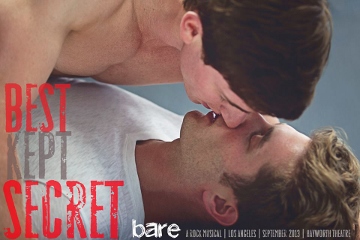
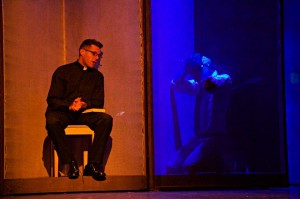
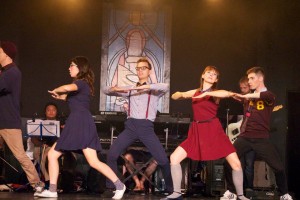
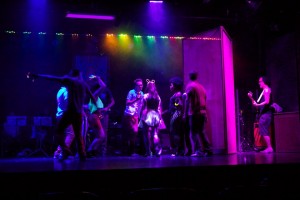
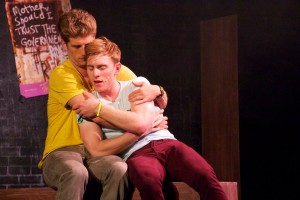
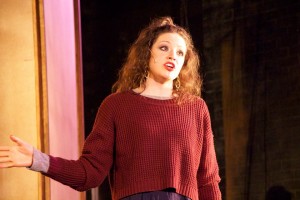
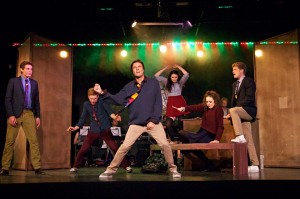
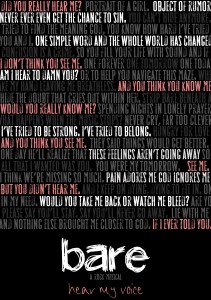

{ 4 comments… read them below or add one }
It’s fine if you don’t like a show or to even walkout. Reviewers are always entitled to their opinion. However, you have no business writing a review if you don’t finish watching the piece.
How can you write an honest, cohesive review when you “cut out†after Act One? It seems to me your review consisted of how everybody looked, nothing about the show itself. You COMPLETELY glossed over the amazing performances of Stephanie Anderson as Sister Chantelle, Alissa-Nicole Koblentz as Claire, Lindsay Pierce as Ivy (although you said she was attractive), John Griffin as Priest, etc. I agree that all reviews are subjective, but how can you publish a review without seeing the second half of the show? It baffles me. What are you paid for? Or are you even paid? This was an amazing show and I’m actually planning on seeing it again.
You leave at intermission, you don’t review the show. Period.
Mr Stanley, anyone who (for very good reasons) won’t call himself a critic bars himself from this conversation.